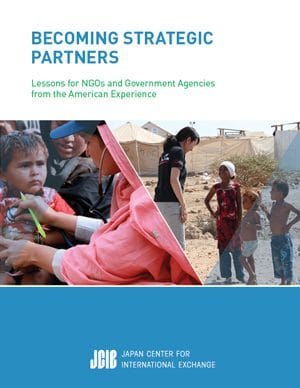Over the last several decades, US-based NGOs have grown to the point that they regularly serve as strategic partners to the American government in planning and implementing international development programs and humanitarian assistance. The US government now channels at least $4 billion per year through these NGOs, and the American NGO sector raises more than four times this amount in additional funding from other sources for their development and humanitarian work. The ability of government agencies and NGOs to operate as strategic partners has become an important source of strength for the United States, empowering a broad swath of American society to support development initiatives and humanitarian work, and giving the United States a significant advantage in advancing its development objectives.
In 2015, JCIE launched a project, NGOs as Strategic Partners: Strengthening US-Japan Cooperation on Development and Humanitarian Assistance, that brought together Japanese NGO leaders and policymaker to better understand the way in which the US government partners with NGOs, and to draw lessons from that for Japan.
A new report from JCIE examines how these strategic partnerships operate and why they emerged, drawing 10 lessons that shed light on how Japanese NGOs might also develop the capacity to partner with government agencies to make Japanese ODA more effective and, in the process, build the foundations for deeper US-Japan cooperation on development.
Key Findings
- There are many important benefits to having NGOs and government agencies that operate as true strategic partners.
- These strategic partnerships only work when each partner trusts the other and the government respects the autonomy of the NGOs they fund.
- The American NGO sector did not always have the institutional capacity to partne
- The development of American NGOs to the point where they could serve as genuine partners to the US government required a strategic effort by proponents within the government, as well as from the NGO sector itself.
- Government funding for NGO institutional capacity building paid off in the long run, which in turn made NGOs less dependent on government support
- Efforts to strengthen the NGO sector were only effective when government funding provided sufficient reimbursement for NGOs’ indirect costs.
- Government agencies helped support the professionalization of the NGO sector.
- NGO leaders had to change their mindsets to successfully champion the development of the sector.
- NGOs can take various steps to ensure that government agencies benefit from their strategic partnerships.
- American NGOs are eager to work with Japanese counterparts, but sustainable US-Japan NGO partnerships are hampered by the lack of institutional capacity in Japan’s NGO sector.

